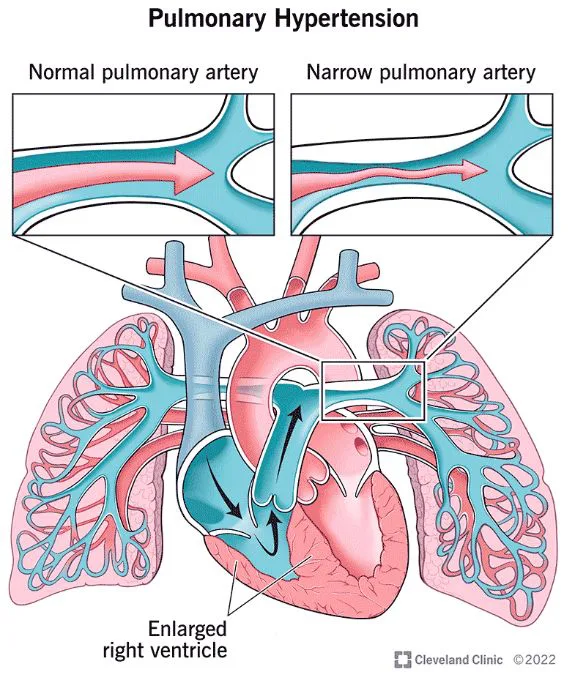
In a groundbreaking study featured in Science Advances, researchers unveil a potential breakthrough in treating pulmonary hypertension.
Pulmonary hypertension is a medical condition characterized by elevated blood pressure in the pulmonary arteries. These arteries are the blood vessels that carry blood from the heart to the lungs for oxygenation.
Increased pressure in the arteries can lead to strain on the heart and consequently potential damage to the arteries. In extreme cases, individuals may necessitate transplantation as a life-saving measure to avert fatal outcomes.
Breakthrough Therapeutic Target Unveiled
Through their groundbreaking research, scientists have identified a novel therapeutic target that can be adjusted to protect cardiac function in individuals grappling with pulmonary hypertension.
This newfound capability offers a potential avenue for developing treatments and brings optimism to the otherwise grim landscape of this currently incurable disease.
Unmasking Pulmonary Hypertension
In the context of pulmonary hypertension, various contributing factors come into play. Some of these include:
- Smoking: The detrimental substances found in tobacco can have adverse effects on the pulmonary arteries.
- Excess Weight: Excess weight puts additional strain on the heart and can contribute to the development of pulmonary hypertension.
- History of Related Conditions: A history of conditions like heart or lung diseases can heighten the risk of developing pulmonary hypertension.
- Genetic Predisposition: A genetic component exists, and individuals with a family history of pulmonary hypertension may have a higher susceptibility to the condition.
- High Altitude Exposure: Extended exposure to low atmospheric oxygen at high altitudes can be a risk factor, potentially impacting pulmonary circulation.
Understanding and addressing these risk factors is crucial in managing and preventing the development of pulmonary hypertension. Although, existing treatments primarily focus on the lungs to reduce blood pressure. Unfortunately, these approaches don’t enhance cardiac function, leading to heart failure as the primary cause of death in affected patients.

MCJ Emerges as Key Therapeutic Target
Dr. Guadalupe Sabio and her team at CNIC in Madrid uncovered a significant discovery. They found heightened levels of a mitochondrial protein, MCJ, in patients suffering from chronic obstructive pulmonary disease (COPD).
Ayelén M. Santamans, the first author, noted that MCJ levels were elevated not only in mice exposed to low oxygen levels but also in pigs with induced cardiac injury. This observation led to the hypothesis that the MCJ protein could be linked to pulmonary hypertension.
The absence of cardio-specific treatments for this disease motivated the researchers to delve deeper into this line of research.
The study reveals that adjusting MCJ levels in the heart can safeguard cardiac function, even in the presence of lung injury.
This safeguarding effect arises from activating a crucial signaling pathway, vital for adapting to low oxygen levels. As a result, the heart becomes prepared to function effectively despite the presence of lung injury, ensuring cardiac function is preserved even when oxygen levels are low.
Takeaway
The emergence of MCJ (Mitochondrial Complex I-Associated Protein) as a key therapeutic target holds significant promise for the future of medical intervention, particularly in the realm of conditions related to cardiac and pulmonary health.
- Innovative Treatments: Researchers and pharmaceutical companies may explore drugs or interventions that specifically target MCJ, aiming to modulate its levels and mitigate associated health risks.
- Precision Medicine: Tailoring treatments based on an individual’s MCJ profile could enhance therapeutic outcomes, providing more personalized and effective care.
- Preventive Strategies: By targeting MCJ, researchers may develop interventions to mitigate the impact of low oxygen levels on cardiac and pulmonary health. This would possibly prevent the onset or progression of diseases like pulmonary hypertension.
- Improved Patient Outcomes: Preserving cardiac function and preventing adverse remodeling could enhance the quality of life and extend the lifespan of patients with pulmonary hypertension.
- Expanded Research Frontiers: This expanded understanding may lead to further breakthroughs in related fields and contribute to advancements in overall cardiac and respiratory medicine.
In a nutshell, MCJ as a key therapeutic element will open up a whole new world of research. This is also interesting to know that these scientists are looking into how our mitochondria, oxygen levels, and everything that makes our hearts work are connected. Meanwhile, studying MCJ is just the beginning, who knows, what amazing things they might find!
Via: Science Advances



